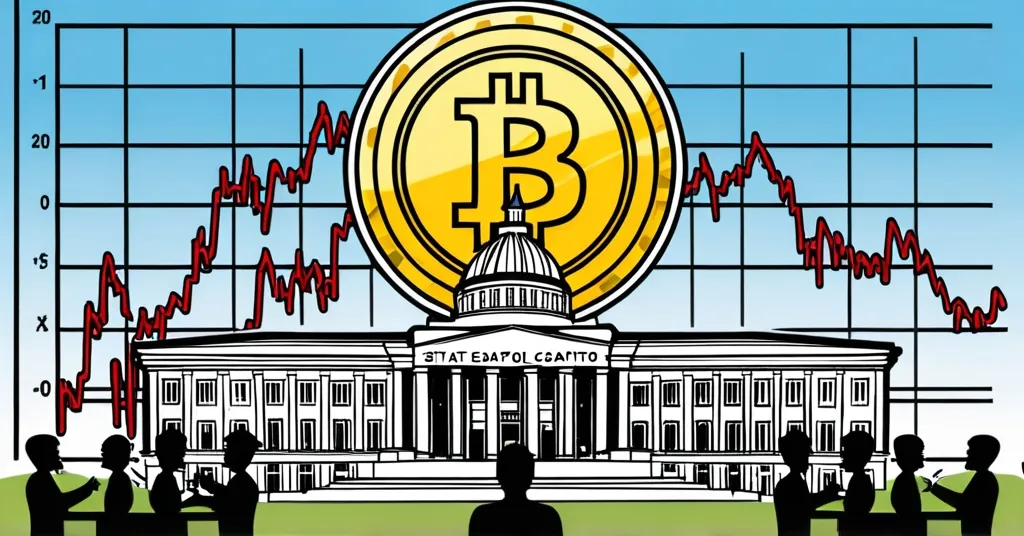Ohio’s Bold Bitcoin Reserve Proposal Sparks Debate on Financial Stability

The Pros and Cons of a Strategic Bitcoin Reserve in US States
Bitcoin’s potential as a financial asset has caught the attention of several U.S. states, with Ohio leading the charge by proposing a Bitcoin Reserve Fund. This initiative aims to include Bitcoin in its investment strategy, positioning it as a potential hedge against inflation. However, the move has sparked intense debate, with experts like Nic Carter warning about the potential destabilizing effects on global financial stability.
- Ohio has proposed a Bitcoin Reserve Fund to invest in Bitcoin.
- Nic Carter warns of Bitcoin’s volatility affecting global markets.
- Bitcoin’s price has swung dramatically from nearly $70,000 to around $30,000 in 2021.
- Lack of clear regulations makes Bitcoin a risky reserve asset.
- El Salvador and the Central African Republic have adopted Bitcoin as legal tender.
- MicroStrategy holds approximately 439,000 Bitcoins, valued at around $46 billion.
Ohio’s proposed Bitcoin Reserve Fund, known as the Ohio Bitcoin Reserve Act, suggests that the state treasurer should have the power to invest in Bitcoin to combat the devaluation of the U.S. Dollar. Derek Merrin, a supporter of the act, emphasizes the need for flexible investment choices, stating, “The U.S. Dollar is being rapidly devalued, and our State Treasurer should have the authority and flexibility to invest in Bitcoin.”
This proposal, however, is not without controversy. Financial expert Nic Carter, from Castle Island Ventures, highlights the risks associated with Bitcoin’s volatility. He stresses that the currency’s wild price swings—such as its drop from nearly $70,000 to around $30,000 in 2021—could undermine confidence in the dollar and destabilize financial markets. Carter cautions, “I don’t think this is going to happen because it would erode confidence in the dollar, and that would be a negative outcome for everyone involved.”
The regulatory environment surrounding Bitcoin further complicates its adoption as a reserve asset. The absence of comprehensive guidelines poses significant challenges, making it a potentially unreliable choice for state reserves. The experiences of El Salvador and the Central African Republic, which have integrated Bitcoin as legal tender, offer insights into the complexities of national cryptocurrency adoption. While these nations experiment with cryptocurrency, skepticism remains about long-term economic impacts.
In contrast, the private sector shows a robust confidence in Bitcoin, with figures like Michael Saylor, CEO of MicroStrategy, championing its use as a reserve asset. MicroStrategy’s massive Bitcoin holdings, approximately 439,000 coins worth around $46 billion, underscore this belief. Matt Hougan, CIO of Bitwise, even suggests that widespread Bitcoin reserves could catapult its price to between $300,000 and $500,000.
As states like Ohio, Texas, and Pennsylvania contemplate Bitcoin in their financial strategies, the discourse reaches a pivotal moment. While Bitcoin offers potential benefits as an inflation hedge, concerns over its volatility and financial instability cannot be ignored. This debate highlights a critical balance: embracing innovation while safeguarding economic stability.
Key Considerations:
- Is Bitcoin a viable hedge against inflation, or do its risks outweigh its benefits?
- Could state-level Bitcoin reserves disrupt the U.S. Dollar’s stability?
- How should regulations adapt to address challenges posed by cryptocurrencies?
- What can be learned from countries that have adopted Bitcoin as legal tender?
The concept of a strategic Bitcoin reserve challenges traditional financial paradigms, prompting stakeholders to deliberate on the future of money and finance in a rapidly evolving economic landscape.



